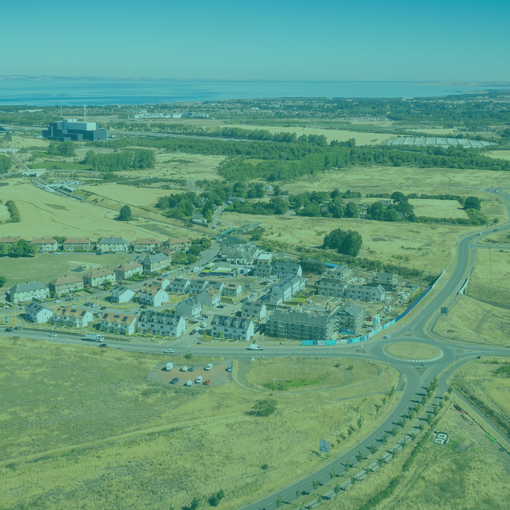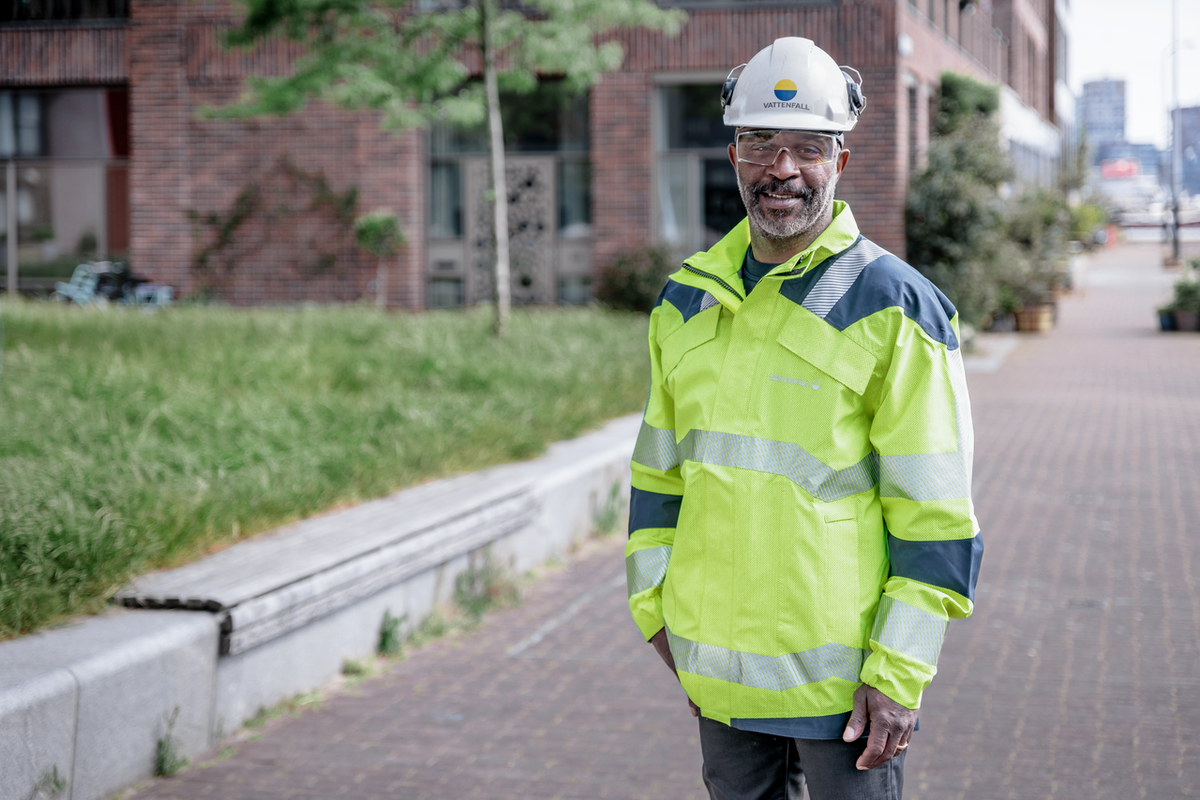
The Midlothian Energy Limited heat network is delivering vital energy infrastructure at the heart of a transformative regional energy transition. Prioritising a just transition, it provides fairly priced, low-carbon heating and hot water to local customers.
Vattenfall has joined Midlothian Council in a partnership to form a 50/50 joint venture known as Midlothian Energy Limited (MEL). The project will supply low-carbon heat to new homes in Midlothian and progress a variety of other energy projects, with £7.3 million in public funding unlocking £40 million in private investment to progress projects.
One of the first projects in the MEL partnership is the design and construction of a heat network for the major urban expansion project of Shawfair Town, a 15-minute train ride from Edinburgh city centre. Shawfair Town is one of Scotland’s largest new development projects led by Shawfair LLP.
The community will have three new schools, extensive cycling and walking networks, and large areas of public open space. In addition to Shawfair Town, the MEL heat network has been expanded to include neighbouring new town, Craighall Village - a development of 620 new houses by Cala Homes.
Vattenfall summary

Scope of scheme: 3,500+ homes in the first phase, with capacity for up to 10,000
The MEL heat network will be powered by surplus heat from waste that cannot be recycled at the Millerhill Recycling and Energy Recovery Centre - an energy from waste plant operated by FCC Environment.
The first phase of this low-carbon heat network project will serve homes, education and retail properties and is expected to save over 2,500 tonnes of CO2 per year - the equivalent of taking 1,200 cars off the road.
Eventually the MEL heat network will expand into existing buildings and other areas in Midlothian and north into Edinburgh, with the MEL energy centre having the potential to heat up to the equivalent of 10,000 homes.
MEL is governed by a board of four key directors - two from Midlothian Council, including a leading council representative, and two from Vattenfall. The joint venture structure is supported by foundational agreements, such as a shareholders agreement and a concession agreement, which define the responsibilities and objectives of each partner.
Each year, MEL’s five-year business plan is reviewed and updated, with new project proposals presented for shareholder approval. This structured approach and roles ensure that the joint venture remains aligned with its mission to deliver innovative, sustainable energy solutions for the region and residents on the heat network.

Customers connected to the heat network are served with reliable heating and hot water at a fair price, with maintenance as part of an all-inclusive service alongside customer care. A team monitors the entire network to ensure it’s running at its best.
The heat tariff has two parts: the fixed charge and the usage charge.
The fixed charge is a fixed amount charged each day which covers:
The usage charge is the cost for each kilowatt hour of heating and hot water used by customers. It varies each month depending on how much heating and hot water is used.
Customers can monitor how much heating and hot water they’re using through the digital in-home display in their home, located near the heat interface unit. Customers can also monitor their heating and hot water usage through the ‘My Vattenfall UK’ app and their online customer account.
The customer care team is available over the phone, via email and live chat and can be contacted 24/7 in case of an emergency. They can also support customers with any billing or usage queries. Customers connected to the MEL heat network have credit meters, rather than pay-as-you-go meters. This means meter readings are sent automatically, resulting in accurate monthly bills, payable online or by direct debit.
Producing low-carbon energy locally builds energy self-sufficiency and resilience, shielding Midlothian residents from the volatile wholesale prices present in fossil fuel markets. Customer charges are reviewed at least once a year as part of the commitment to fair pricing.

A key element of Vattenfall’s customer engagement approach on the MEL heat network has been consistent, visible on-site presence. Their project manager is regularly present on the development and takes a proactive approach to welcoming new residents. Home visits are often made as households move in, providing an opportunity to ensure they are settling in well and to address any questions or concerns they may have.
By establishing personal rapport early on, the project manager has fostered a culture of approachability and trust. Residents are encouraged to stop and speak with him on site at any time to request assistance or seek information. This informal, relationship-led engagement has been well received by customers and supports a responsive, community-focused approach to service delivery.
Vattenfall is also collaborating with developers to introduce on-site drop in sessions, allowing residents to ask questions about their service and bills in person.

When customers move into their new homes, they receive a welcome pack designed to guide them through the heat network in their property. This brochure includes:
Extra Care supports customers with additional communication needs or those in vulnerable circumstances. It offers tailored assistance from accessible formats for communications to the option to nominate a trusted relative or friend to help manage their heat account.
In addition to this, customers receive a welcome call within a week of move-in, giving them a chance to settle in before speaking with a team member who can answer any questions and provide reassurance about using the system.
A series of easy-to-follow ‘how-to’ video guides have been developed, covering essential topics such as:
These resources help make the onboarding process as smooth and seamless as possible.
Finally, as part of a commitment to continuous improvement, customer surveys are issued twice a year to gather feedback on key service areas, helping to identify opportunities to enhance the customer experience.
For households, the MEL network provides reliable, fairly-priced heating and hot water with maintenance as part of an all-inclusive service alongside expert customer care. Automated billing, customer support, and tailored services for vulnerable customers contribute to a smooth and inclusive user experience. Close collaboration with developers has also enabled coordinated delivery, improved customer onboarding, and strong uptake.

A key factor in ensuring the long-term sustainability and viability of this type of scheme is strong community engagement, which is central to the approach of the MEL partnership. The MEL model is rooted in a community-led energy strategy, supported by a 50/50 partnership with Midlothian Council. This collaboration ensures transparency in investment decisions and provides reassurance to customers that their interests are safeguarded.
One of the key learnings from the partnership has been the critical role of local authority involvement. Their active participation and oversight strengthens the project - from increasing public confidence to driving higher levels of customer uptake, both are essential to the success of heat networks. MEL provides regular briefings to elected members, enabling committee review and approval of the annual business plan. To date, this plan has been accepted without amendment every year of MEL’s operation, providing further reassurance to customers and stakeholders.
In the current absence of statutory regulation in the UK, Vattenfall has voluntarily registered the heat network with Heat Trust. This demonstrates Vattenfall's commitment to delivering a high standard of customer service, with regular monitoring and independent audits. The Heat Trust scheme imposes rigorous consumer protection standards, comparable to those applied to gas and electricity providers, and ensures access to an independent dispute resolution service via the Energy Ombudsman.
As part of the MEL partnership, the MEL heat network has the potential to scale significantly, eventually expanding into existing buildings across Midlothian and extending northwards into Edinburgh. The MEL energy centre is designed with the capacity to supply heat to the equivalent of up to 10,000 homes.